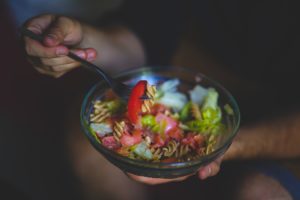
35% of adults in the US are obese, but a study published in Frontiers in Psychiatry found that 10% of underweight participants met the criteria for a food addiction [1]. Addiction is typically associated with drugs or alcohol, but research has shown that food addictions activate the same reward and pleasure areas of our brain that substances do [3, 4].
Understanding a Food Addiction
Food addiction can be characterized as being:
-
- Obsessed with food cravings, or preoccupation with getting and consuming food;
- The misuse of food through binging or compulsive overeating;
- Attempts to try to manage overeating or binging, and relapsing into symptomatic behaviors;
- Loss of control when eating;
- Noticing food having a negative impact on work performance, family life, finances, or social activities;
- The urge to consume more food in order to gain the same sense of emotional release or comfort.
Feeding behaviors are part of a network of neural circuits that include the hypothalamus, the dorsolateral prefrontal cortex, amygdala, striatum and midbrain. These systems regulate feeding behavior and food consumption that is modulated through energy needs and reward and pleasurable feelings [4].
Signs and Symptoms of a Food Addiction
There are various types of symptoms to food addiction, physical, emotional, and social [2]. Physical symptoms of a food addiction are the physical consequences to our body when we overeat.
Typically health issues or complications, obesity, diabetes, high cholesterol are just to name a few. Individuals who are underweight, may use extreme fasting, restriction, or purging methods to keep weight low.
 Either extreme can be harmful to your body physically and create long term medical issues. when an individual has attempted weight loss through various ways and nothing has worked on a long term basis.
Either extreme can be harmful to your body physically and create long term medical issues. when an individual has attempted weight loss through various ways and nothing has worked on a long term basis.
Emotional symptoms of a food addiction is when the emotions become so severe the person uses food as a coping mechanisms.
Often individuals who are suffering with a food addiction typically have prior histories of abuse and trauma, and comorbid disorders [6]. Turning to food can be a source of comfort and numbing to the emotional issues.
Social symptoms of a food addiction can include isolation, low self esteem, and poor relationship skills. Often times those with food addictions are eating in secret, and trying to manage feelings of guilt and shame.
Many people feel more excitement over food at gatherings than being with people and socializing. Often they want to be left alone with their addiction and begin to pull away from friends and family which can intensify mental health issues such as depression, anxiety, and obsessions [2].
According to Kay Sheppard, a pioneer in the treatment of food addiction, states that food addiction implies that there is a biochemical condition in the body that creates a physiological craving for specific foods. The craving and biochemistry is comparable to that of an alcoholic’s craving for alcohol [3].
Mrs Sheppard goes on to state that food addictions are chronic, progressive disease due to the fact that food addictions never truly go away. It is seen as progressive because more food is needed over time to achieve the same high.
Assessing a Possible Food Addiction
So how do you know if you have a food addiction or be able to identify them in a friend or loved one? There are various things to look for and identify. If you are an individual assessing if you have a food addiction do you feel that you,
- Think about food all of the time
- Focus on food obsessively, or in a way that makes it difficult to function at work on home
- Are you spending increasing amounts of money on binge foods?
- Do you have decreased energy or chronic fatigue from overeating?
- Do you feel that you have difficulty concentrating?
- Do you notice sleep issues or insomnia?
- During the day do you feel restless, have increased headaches or notice more digestive issues?
If you are concerned for a loved one or friend, some signs to look for are,
- Eating in secret
- Eating to the point of feeling ill or nauseous
- Isolation or decreased social interaction
- Stealing or hiding/hoarding food
- Very fast eating and eating large amounts of food in a short period of time
- Reported increased sleeping or less sleep
- Concerns for depression, anxiety, or suicidal thoughts or actions
If you answered yes to most of these questions, it would be recommended to talk with a professional therapist or psychologist about your eating and feeding patterns to see if you are struggling with a more serious problem.
Food Addiction is typically characterized as a building tolerance to amounts of food, a withdrawal period when binge foods are not available or the person is not able to finish overeating.
 Attempts at stopping but unable to, or continued relapse, as well as preoccupation and obsession with obtaining and eating food. A noticeable difference in social activities (work or personal), and use of binging/overeating despite continued physical and/or psychological issues because of food addiction [3, 8].
Attempts at stopping but unable to, or continued relapse, as well as preoccupation and obsession with obtaining and eating food. A noticeable difference in social activities (work or personal), and use of binging/overeating despite continued physical and/or psychological issues because of food addiction [3, 8].
In conclusion, food addiction is similar to that of substance addiction. A person struggling needs to seek out treatment from professional therapists and/or treatment center to begin learning and practicing healthy relationship with food.
Community Discussion – Share Your Thoughts Here!
Do you or someone you know have a food addiction? What characteristics do you think make up overeating and a food addiction? At what point would you call eating a food addiction?
 About the Author: Libby Lyons, MSW, LCSW, CEDS, is a Certified Eating Disorder Specialist (CEDS) who works with individuals and families in the area of eating disorders. Mrs. Lyons works in the metropolitan St. Louis area and has been practicing in the field for 11 years. Libby is also trained in Family Based Therapy (FBT) to work with children-young adults to treat eating disorders. Mrs. Lyons has prior experience working with the United States Air Force, Saint Louis University, Operating Officer of a Private Practice, and currently works with both Saint Louis Behavioral Medicine Institute within their Eating Disorders Program and Fontbonne University
About the Author: Libby Lyons, MSW, LCSW, CEDS, is a Certified Eating Disorder Specialist (CEDS) who works with individuals and families in the area of eating disorders. Mrs. Lyons works in the metropolitan St. Louis area and has been practicing in the field for 11 years. Libby is also trained in Family Based Therapy (FBT) to work with children-young adults to treat eating disorders. Mrs. Lyons has prior experience working with the United States Air Force, Saint Louis University, Operating Officer of a Private Practice, and currently works with both Saint Louis Behavioral Medicine Institute within their Eating Disorders Program and Fontbonne University
References:
[1] Food Addiction Treatment, Signs and Causes. (n.d.). Retrieved January, 2017, from http://americanaddictioncenters.org/food-addiction-treatment/
[2] Are You a Food Addict? (n.d.). Retrieved January, 2017, from http://www.foodaddictsanonymous.org/are-you-food-addict
[3] Food Addiction. (n.d.). Retrieved January, 2017, from http://www.foodaddictionsummit.org/foodaddiction.htm
[4] “Eating addiction”, rather than “food addiction”, better captures addictive-like eating behavior. (n.d.). Retrieved January, 2017, from http://www.sciencedirect.com/science/article/pii/S0149763414002140
[5] Advisor, T. A. (n.d.). Food Addiction. Retrieved January, 2017, from https://theaddictionadvisor.com/food-addiction/
The opinions and views of our guest contributors are shared to provide a broad perspective of addictions. These are not necessarily the views of Addiction Hope, but an effort to offer discussion of various issues by different concerned individuals.
We at Addiction Hope understand that addictions result from a combination of environmental and genetic factors. If you or a loved one are suffering from an addiction, please know that there is hope for you, and seek immediate professional help.
Reviewed By: Jacquelyn Ekern, MS, LPC on March 19, 2017.
Published on AddictionHope.com
